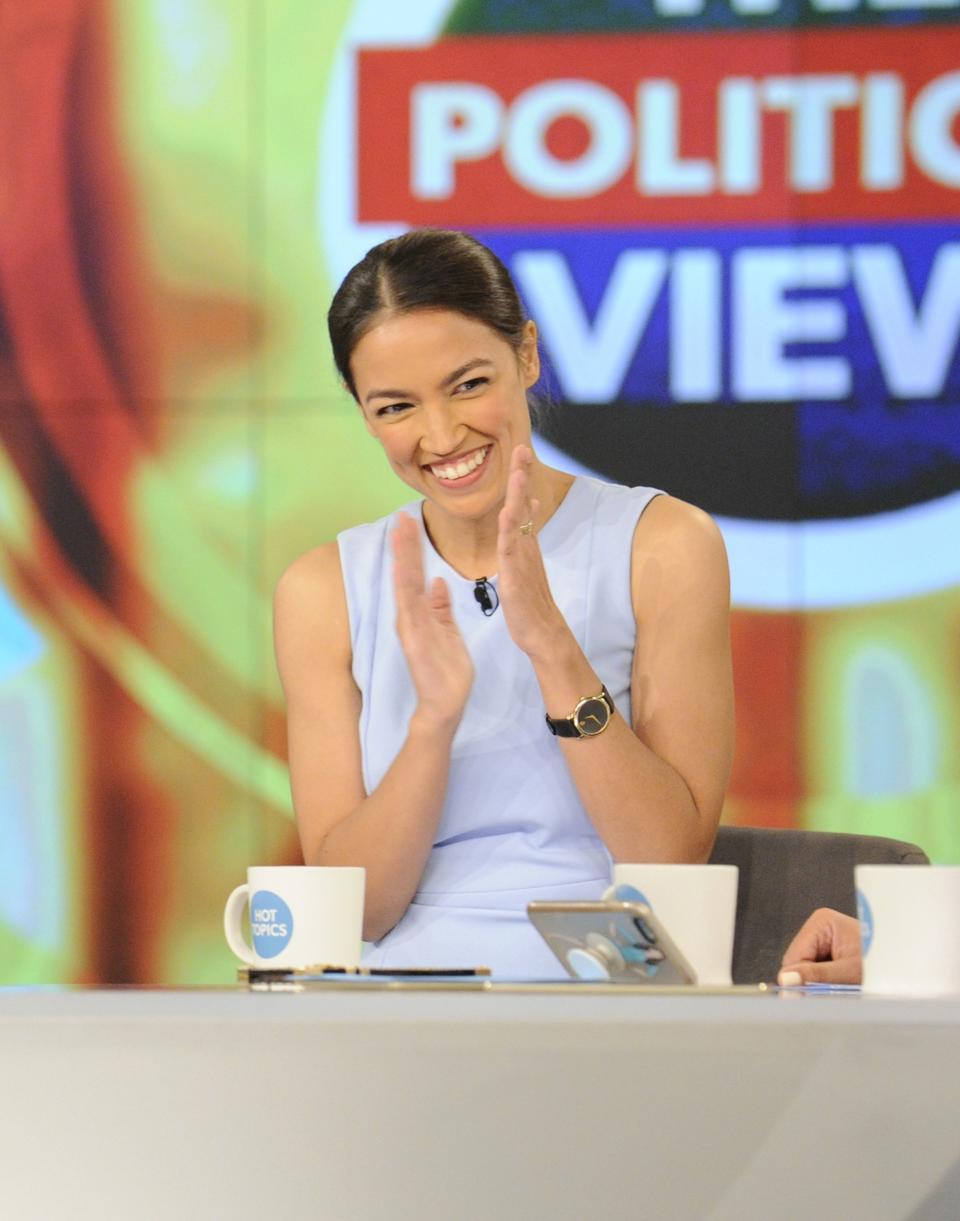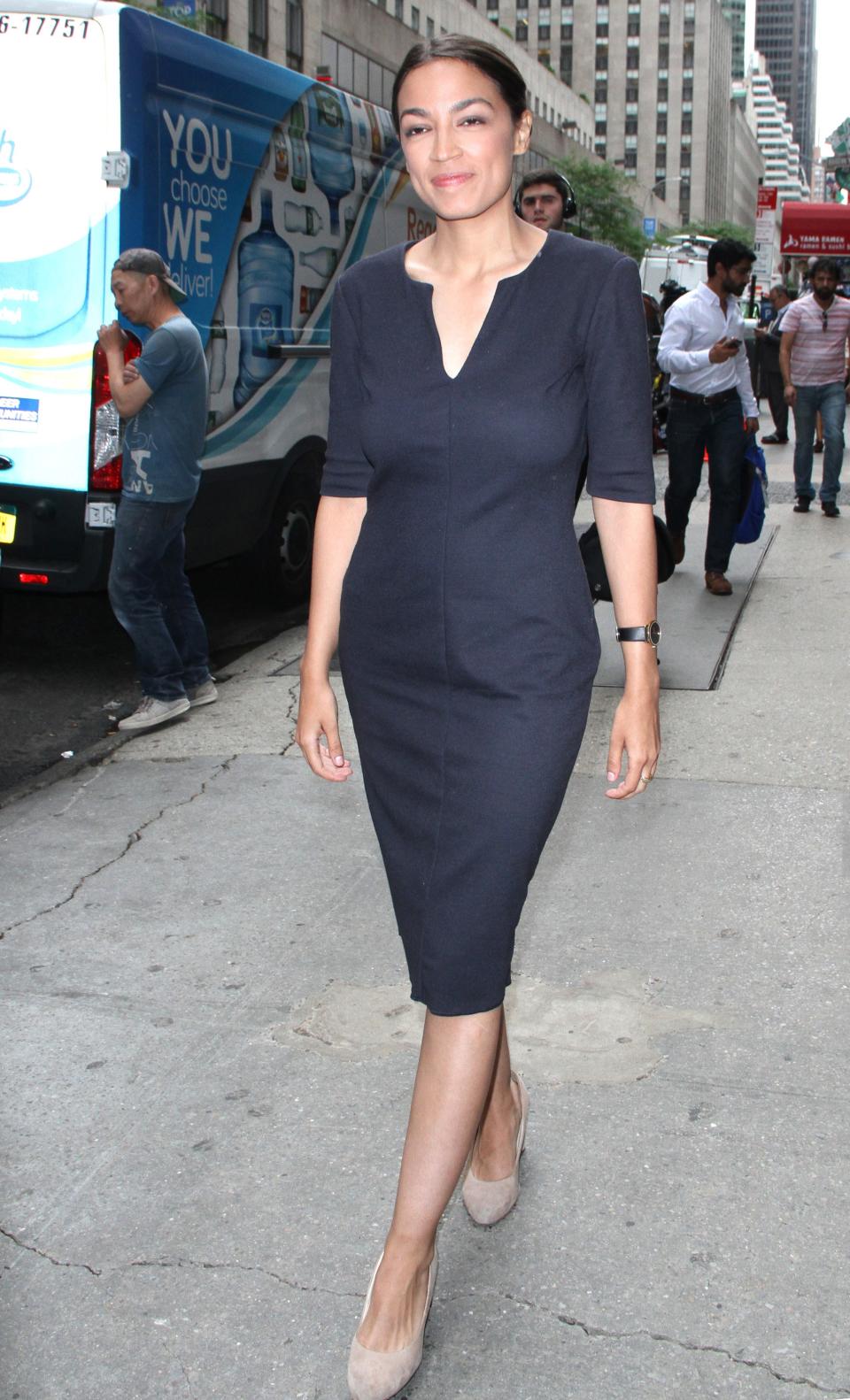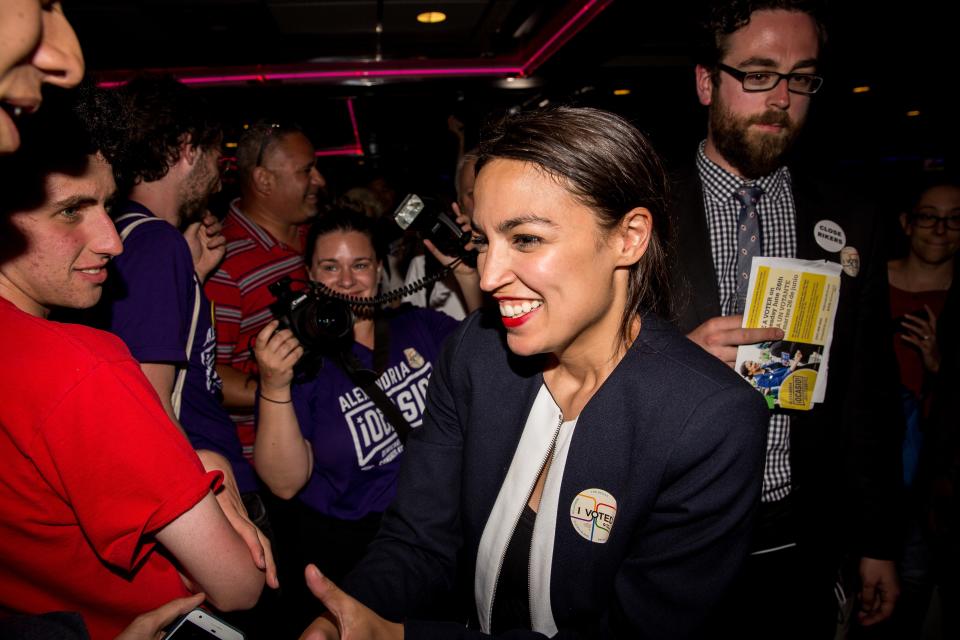It’s 2018, and Female Candidates Are Tweeting About Lipstick. Is This Progress?
Imagine, for a second, that you’re a candidate for the United States Congress with the following profile: female, 28, minority, with a resume that doesn’t include any elected positions but does include bartender. Your primary opponent, meanwhile, is male, 56, white, has three decades of experience, and isn’t only the incumbent but one of the most powerful figures in the Democratic party. It’s a challenge to even get him to show up to debate you (he sent a surrogate in his place during your first scheduled face-off), and when you finally get the chance to square off with him, a week before the election—right around the time polls begin to show that, wait a second, you might actually have a chance at winning this thing—you decide to seize the moment with an important tweet. About lipstick.
It might sound like a gaffe, a sort of beauty-aisle version of Howard Dean’s primal scream. Yet that’s exactly what Alexandria Ocasio-Cortez did hours after she debated Rep. Joe Crowley on June 16 and—spoiler alert for anyone getting on the Internet for the first time in a week—went on to win the democratic primary for New York’s 14th Congressional District in an upset so stunning it dominated the national news on a day when a Supreme Court justice announced his resignation.
The tweet in full: "I have been getting so many inquiries about my debate lip color in the last two days," she captioned a picture of a flat-screen TV broadcasting a close-up of her (impeccably ruby-lipped) face during the debate. “I GOT YOU. It's Stila "Stay All Day" Liquid in Beso [lipstick emoji]."
Women in politics have always had a fraught relationship with fashion and beauty, and there’s a spate of evidence to support that—unlike their male counterparts—they’ve got to look good and be competent to have a shot at winning. But not too good, because that’ll hurt their credibility. The narrative had long been that real progress would only be achieved when the clothes female politicians wear or how they do their hair isn’t something that factors into our conversations or the way we vote. (How many times have you read a headline along the lines of: “It’s [insert year], why are we still talking about [insert female politician]’s clothes?”)
Likewise, conventional wisdom for female candidates has been they shouldn’t ever acknowledge their makeup or outfit choices (leave the press releases to the discretion of the designer’s PR) and instead walk onto the debate stage in a custom Ralph Lauren jacket that was vetted by eight image consultants, a face full of Temptu, and a tasteful lob held in place by two cans worth of Elnett. The goal: to get the public to focus on the budget surplus, not a suit. Consider this exchange Hillary Clinton had in 2010 while speaking on a panel in Kyrgyzstan:
A congressional candidate willingly sharing beauty tips seems to challenge the bounds of what seems appropriate in politics, but there’s been very little about Ocasio-Cortez that’s been by the book.
Consider this exchange Hillary Clinton had in 2010 while speaking on a panel in Kyrgyzstan:
Moderator: Which designers do you prefer?
Hillary: [Awkward pause] What designers of clothes?
Moderator: Yes.
Hillary: Would you ever ask a man that question?
Moderator: [Really awkward pause] Probably not. Probably not.
[Resounding applause from the audience]
So it’s remarkable that here we are eight years later, and there’s a candidate—a young progressive candidate, no less—who’s not only fielding questions about her appearance but doing so voluntarily, with the enthusiasm of a genuine beauty junkie.
“I’ve never seen anything like it before,” says Chris Jahnke, a Washington, D.C.-based speech coach who was a consultant on Clinton’s 2008 campaign and has worked with Michelle Obama. “It goes against the conventional wisdom of how women candidates should act.”
"If Hillary was revolutionary on pushing back on critiques of her clothing, Alexandria’s revolutionary in saying, ‘I’m a woman who wears lipstick,'" says Kelly Dittmar, a political science professor at Rutgers University and a scholar at the Center for Women in Politics.
Equally remarkable was the tweet’s reception: more than 5,000 likes and nearly 80 comments, most being of the “yesss girl” variety. “To be honest, [your lipstick was] so fierce, I’m surprised the moderator didn’t ask,” one follower wrote, with another remarking, “A true queen. Saving the community and [sic] keep the ladies up to date on makeup and style. I stan!” On the heels of Ocasio-Cortez’s victory, the post got a second wind, even bigger than its first go-round—getting pickup by national news outlets with the kind of breathless enthusiasm usually reserved for stories about Meghan Markle’s royal wedding foundation. By the end of the week, the inevitable: The candidate’s $22 lipstick of choice had sold out on both Stila’s website and Sephora’s.

ABC's "The View" - Season 21
A congressional candidate willingly sharing beauty tips seems to challenge the bounds of what seems appropriate in politics (even in this climate), but, then again, there’s been very little about Ocasio-Cortez that’s been by the book. She’s not even 30 years old and a political neophyte, yes, but she’s also a self-described socialist who hasn’t taken a dime of corporate money for her campaign. (More than two-thirds of her campaign’s $300,709 in fundraising came from small donors, or those who contributed $200 or less, according to reports.) Even her choice to wear that particular shade of lipstick in the first place—a bold red with blue undertones and matte finish—was relatively surprising. Same goes for the style choices that she hasn’t tweeted about: trendy oversize wire frames to canvas in Queens and a pair of skinny white jeans to visit border detention centers in Texas. And it’s this very quality of being a different kind of candidate that she’s played up during the campaign, including a viral ad that features the opening line, "Women like me aren't supposed to run for office."
As unprecedented as Ocasio-Cortez’s tweet may be, it seems to be part of a broader trend of current female candidates losing the political-statue act and leaning into authenticity.

Alexandria Ocasio-Cortez Upsets Rep. Joseph Crowley In NY Primary
“A record number of women are running for office, and they’re trying to run unapologetically as themselves,” says Amanda Hunter, communications director at the Barbara Lee Family Foundation in Cambridge, Massachusetts, which promotes gender equality in politics and contemporary art. She points to Wisconsin Democratic gubernatorial candidate Kelda Roys, who, in March, put out a campaign ad in which she talks through the finer points of her platform while breastfeeding. “There’s no such thing as conventional wisdom in this election cycle,” says Jahnke. “We’re debunking myths all over the place as women candidates become more free to be themselves.”
Granted, appearing authentic is often a studied move when you’re in the public eye—and one that’s having a moment, but there are distinct strategic advantages. “Alexandria’s a candidate who’s built her persona on being like you,” says Dittmar. “And a lot of women in the U.S. wear lipstick.”
One of the things that women candidates must be able to do is connect with voters—men will go on TV and they’ll have their favorite baseball cap on. They do it with abandon.
“She’s normalizing how women talk to one another,” adds Jahnke. “One of the things that women candidates must be able to do is connect with voters and what that means is coming across as approachable... Because men obviously have had their version of this—you’ll see this all the time, men will go on TV, and they’ll have their favorite baseball cap on—they do it with abandon, without shame.”
But breastfeeding in a campaign ad is one thing—that spot, conveniently, was lead-in to Roys discussing her successful ban of BPA, a toxic chemical found in baby bottles—makeup and fashion, another. And there’s a reason that conventional wisdom is what it is: In 2013, the Women’s Media Center conducted a study of 1,500 likely voters that found no matter what is said about a female political candidate’s appearance, the more coverage her looks get, the less likely they are to vote for her—a point experts think is still worth considering, regardless of whether the candidate appears to care. “The concern has been that if you open that door, then it’s fair game for the media to take stories about your appearance and run with it. Her campaign may want to take a look at how many stories come out about just that tweet,” says Dittmar, on whom the irony of her comment was not lost. “I mean, you’re writing this story, right?”
“Women have to work twice as hard as men to prove they can do their job, so there could be a danger in appearing frivolous. Women still have to walk a tightrope," says Hunter. "I wouldn’t recommend, you know, talking about how much you love Benefit makeup during a debate."

Celebrity Sightings In New York - June 27, 2018
It may seem like obvious advice, but the truth is, in today’s age of increased transparency, it’s become pointless at best and harmful at worst for politicians to hide the fact that they put effort into the way they look. (Remember the backlash when it became public that Sarah Palin spent $150,000 on Escada skirts for the 2008 campaign or that John Edwards spent $400 on a haircut?) Even Hillary Clinton—five years after calling that journalist sexist for asking about her favorite designers—posted her first Instagram, with a neat line of red, white, and blue pantsuits hanging on a garment rack and the caption, "Hard choices." Yes, it was a quiet jab at the fact that the media had been so fixated on her clothes (softened by a bit of self-deprecation winking to criticism that she’s a formulaic dresser), but it demonstrated that even this woman, so famously guarded about her public image, felt it was time to pull back the curtain on her fashion choices.
Still, don’t expect every local female politician to be tweeting her fashion and beauty credits. “Even though we’re allowing women to be more full versions of themselves, not every candidate is going to do that,” says Dittmar. Adds Hunter: “We always say, ‘Every race is different, every woman is different, and it comes down to finding a balance that’s right for them.’”
In fact, it looks like that’s a balance that can even change by the day for a candidate: Just a week before she spread the gospel of her great lipstick to the internet, Ocasio-Cortez tweeted a picture of a stack of campaign materials that featured a portrait of her without even a swipe of lipgloss. She captioned it: “Sending out a no-makeup GOTV mailer. Are we living in a feminist Utopia yet?”


